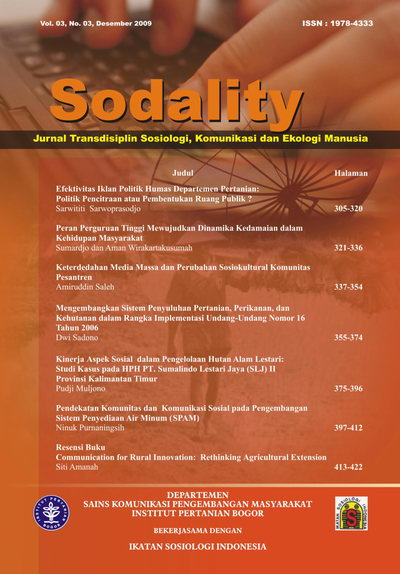Peran Perguruan Tinggi Mewujudkan Dinamika Kedamaian dalam Kehidupan Masyarakat
Abstract
In any civilization, peacefulness or non-violence culture could be the ultimate end of human life. It contains human right principles to be achieved by community, civics, and nation. Albeit, in reality, the situation achieved is diametrically in the opposite to what expected where competition, contravention and social conflict arises very sharply unless a constructive conflict management is applied. The potentiality of social conflict to occur may be reduced to a tolerable rate when constructive dialogues can be built. The dialogues should be able to facilitate the development of convergence communication and the actualization of equality principles. Higher education processes will be one the most important institutions that could bring the actualization of the principles of peacefulness into reality. This could be true when education could assure the effectiveness of value transformation processes throughout generations. The role of high education institutions to make non-violence culture to become apparent is essential. The dynamic life in a peaceful culture can only be realized when a situation of welfare, equality and well expression of communication behavior are well maintained in the community life.
Published
2009-12-16
How to Cite
Sumardjo., WirakartakusumahA., & WirakartakusumahA. (2009). Peran Perguruan Tinggi Mewujudkan Dinamika Kedamaian dalam Kehidupan Masyarakat. Sodality: Jurnal Sosiologi Pedesaan, 3(3). https://doi.org/10.22500/sodality.v3i3.5860
Section
Articles
Authors who publish with this journal agree to the following terms:
- Authors retain copyright and grant the journal right of first publication with the work simultaneously licensed under a

This work is licensed under a Creative Commons Attribution 4.0 International License. that allows others to share the work with an acknowledgement of the work's authorship and initial publication in this journal. - Authors are able to enter into separate, additional contractual arrangements for the non-exclusive distribution of the journal's published version of the work (e.g., post it to an institutional repository or publish it in a book), with an acknowledgement of its initial publication in this journal.
- Authors are permitted and encouraged to post their work online (e.g., in institutional repositories or on their website) prior to and during the submission process, as it can lead to productive exchanges, as well as earlier and greater citation of published work (See The Effect of Open Access).





.png)









